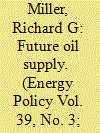| Srl | Item |
| 1 |
ID:
128346


|
|
|
|
|
| Publication |
2014.
|
| Summary/Abstract |
This paper discusses the criticisms of the IEA World Energy Outlook raised by Aleklett et al. (2010), often referred to as the 'Uppsala critique'. The major argument of Aleklett et al. is that the rates of depletion, the ratio of annual production to remaining resources or reserves, assumed by the IEA in certain categories of fields are unreasonable. In this paper, we call into question the reductions in future global oil production that Aleklett et al. argue are necessary: they have incorrectly applied a depletion rate for all fields within a region to different subsets of fields within a region. The more minor reductions to future global oil production that Aleklett et al. argue are needed because of the IEA modelling of the production of bitumen and natural gas liquids are also examined briefly.
|
|
|
|
|
|
|
|
|
|
|
|
|
|
|
|
| 2 |
ID:
103454


|
|
|
|
|
| Publication |
2011.
|
| Summary/Abstract |
The IEA was established in 1974 with a mandate to promote energy security amongst its members, namely the states of the OECD, and to advise those members on sound energy policy. Its recent forecasts of the medium and long term prospects for oil supply, however, have wavered, alternating from optimistic to pessimistic and back again. For policy-makers, such inconsistency is difficult to deal with. Firstly we examine whether the changing outlooks seen in IEA forecasts made between 2007 and 2010 truly reflect a demonstrable, underlying change in the known facts, and we can find no such factual changes reported by the IEA. Secondly we examine whether the serious criticisms of the IEA's (2008) forecast made by other analysts have yet been addressed, and we conclude that they have not. Thirdly we consider the possible effects of the current economic downturn upon the IEA's assumptions and upon future oil supply. We conclude that all the forecasts made by the IEA appear to be too optimistic throughout this period.
|
|
|
|
|
|
|
|
|
|
|
|
|
|
|
|
| 3 |
ID:
094289


|
|
|
|
|
| Publication |
2010.
|
| Summary/Abstract |
The assessment of future global oil production presented in the IEA's World Energy Outlook 2008 (WEO 2008) is divided into 6 fractions; four relate to crude oil, one to non-conventional oil, and the final fraction is natural-gas-liquids (NGL). Using the production parameter, depletion-rate-of-recoverable-resources, we have analyzed the four crude oil fractions and found that the 75 Mb/d of crude oil production forecast for year 2030 appears significantly overstated, and is more likely to be in the region of 55 Mb/d. Moreover, analysis of the other fractions strongly suggests lower than expected production levels. In total, our analysis points to a world oil supply in 2030 of 75 Mb/d, some 26 Mb/d lower than the IEA predicts.
The connection between economic growth and energy use is fundamental in the IEA's present modelling approach. Since our forecast sees little chance of a significant increase in global oil production, our findings suggest that the "policy makers, investors and end users" to whom WEO 2008 is addressed should rethink their future plans for economic growth. The fact that global oil production has very probably passed its maximum implies that we have reached the Peak of the Oil Age.
|
|
|
|
|
|
|
|
|
|
|
|
|
|
|
|